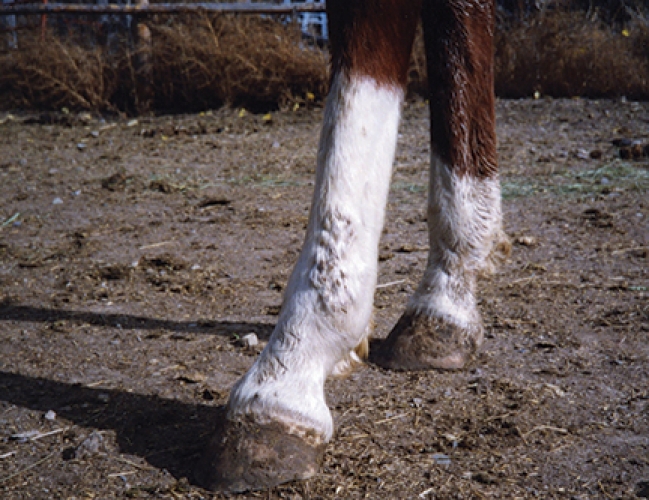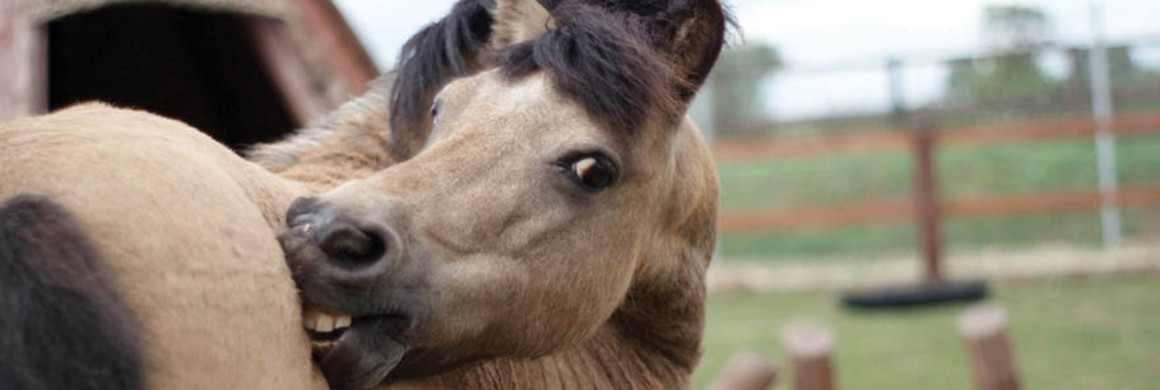Horses and their skin! There are sooooooo many things that can appear on your precious pony’s skin. Horses can have skin issues that appear suddenly even with no prior history of problems or they can be persistent and return infrequently over time.
 Have you noticed anything funky with your horse’s skin?
Have you noticed anything funky with your horse’s skin?
Do you know what it is or when to call the vet?
Do you have anything on hand to help ease the itching, or in some cases, pain?
Skin issues can arise from seemingly nowhere and for a myriad of causes- heat, sweat, bug bites, something they ate, odd weeds in their hay, digestive problems, or underlying issues with their health.
There are some things you can do, and know when to call the vet, but first, let’s look at the long list of issues that it could be.
Skin Problems in Horses
These are just a few of the known skin problems with horses. My horse also had a skin problem appear out of nowhere. If your horse doesn’t match these or their symptoms, there may be something going on with the health. If the problem persists, please call your vet.
- Rain Rot/Scratches/Mud Fever/Sweet Itch
- Lice
- Warts
- Aural plaques
- Dandruff
- Neck Threadworms
- Mange
- Ringworm
- Sarcoids
It is difficult to treat the skin issue until you know what it is. Googling pictures of each symptom can help you see if your horse has anything that looks similar.
Disclaimer** There are affiliate links listed in this post. By using the link to purchase, I earn a small commission that helps support this blog and my horse habit at no extra cost to you. Thank you for your support.

In my case my horse is an older gelding. He began itching his face, and within two days, had itched himself bloody. He wouldn’t eat, all he wanted to do was itch his face, and it spread up to his cheeks, under his jaw, up near his eyes and a few areas on his throatlatch.
The vet thought it was something he ate. He shared a waterer and touched noses with my second horse stalled next to him (terrifying during this time of course) and my other horse never got anything. We tried steroid creams, soothing shampoo, and a few other things that helped. Still, it took weeks to heal and since then I have seen little rubbed areas appear since then and many months later.
I keep a few things in my arsenal now but there is one item that cured him. I use it anytime I see any sign of him itching which has been significantly less since that horrible incident with the mystery skin problem.
I keep these items in my barn (items linked):
Betadine
The blue stuff
Durvet Topical Fungicide (this item is what worked to heal my horse and continues to do so)
**I also put my older gelding on Platinum Performance Skin & Allergy and have noticed zero issues since then!**
I can’t tell why the Durvet worked, and the others didn’t and my vet couldn’t tell me either. Horse skin issues are so vast and there are so many causes that it can be hard to determine the solution.

BUT, I waited too long to call the vet. If your horse is showing signs of discomfort and continues to itch, not eat, not move, or is otherwise acting off, please call your vet. You want to take care of the problem before it turns into something much bigger and much more awful which is what happened in my gelding’s case.
A good grooming will always do your horse right. Getting all the dirt and excess hair off will help promote a healthy, shiny coat. You can note any skin abnormalities as well when grooming and watch them for any signs of spreading or causing your horse distress.
Skin issues can be frustrating, but being prepared with a few items on hand and knowing when to call your vet is the most important thing you can do for your horse. Fly spray in the warmer months will also help prevent skin problems from bug bites.
Don’t get down about skin problems with your horse. Check their hay, any feed, and water for anything that looks like it could be the cause, and watch for spreading of the problem, itching and discomfort. Keep the area clean and monitor it closely. If your items at home don’t help your horse, then you know it is time to call the vet.
2 thoughts on “Common Horse Skin Problems”
Comments are closed.